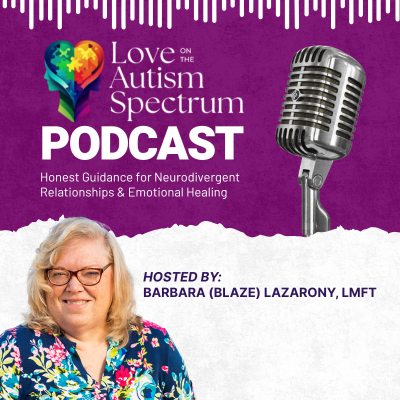Imagine a world where everyone communicates love in the same way—it would be pretty monotonous, wouldn’t it? Thankfully, our world is diverse, including how we express and receive love.
This blog post will decode unique neurodiverse love languages and explain how understanding these can strengthen relationships and promote emotional well-being.
Key Takeaways
- Understanding Neurodiversity and Love Languages can build empathy, create stronger relationships, and foster acceptance.
- Embrace the five neurodivergent love languages to experience more fulfilling relationships with emotional fulfillment.
- By validating and accommodating each other’s needs, we can overcome communication barriers and increase both partners’ mental health and well-being.
Introduction to Love Languages
Love Languages, a concept popularized by Dr. Gary Chapman, offer a framework for identifying how people communicate and receive love. The traditional five love languages—words of affirmation, acts of service, receiving gifts, quality time, and physical touch—are widely recognized as different ways people give and receive love. However, for neurodivergent individuals, particularly those on the autism spectrum, these traditional love languages may not fully capture the ways they experience and express affection.
Neurodivergent love languages are an evolving idea gaining attention within autistic culture and across social media. These unique expressions of love are tailored to the specific needs and preferences of neurodivergent individuals, offering a more nuanced understanding of how they connect with others. By recognizing and embracing neurodivergent love languages, we can foster more meaningful and supportive relationships that honor all the things and diverse ways love is experienced and expressed.
Understanding Neurodiverse Love Languages
Neurodivergent love languages are exciting ways in which neurodivergent individuals, including those from autistic cultures, express and receive love tailored to their unique needs and preferences. These love languages stand out from traditional ones, helping family members better understand each other and fostering more profound connections. Some examples of neurodivergent love languages include:
- passionate info dumping
- comforting parallel play and body doubling
- caring support swapping
- soothing deep pressure
- meaningful penguin pebbling
Grasping these unique and diverse expressions and receptions of love can strengthen empathy and relationship connections. A more profound exploration of neurodiversity and its relationship impacts can educate us on adapting and warmly accepting these neurodivergent love languages.
Defining Neurodiversity
Neurodiversity refers to the natural variations in human cognition, emphasizing the value of diverse thinking styles among neurodivergent folks. Neurodivergent people have unique cognitive abilities and are not intellectually inf”rio” “or “ab” or”al”l.” Some examples of medical conditions that can lead to neurodivergence are:
- Autism spectrum disorder
- ADHD
- Dyspraxia
- Dyslexia
- OCD
- Complex-Trauma
- Traumatic Brain Injury
Autism, for instance, is a spectrum disorder, meaning it can present itself in various ways, with a person’s struggles and individual experiences being unique.
When we delve into neurodiverse love languages, comprehending neurodiversity becomes crucial. This insight enables us to appreciate the multiplicity of expressions and receptions of love by neurodivergent people, thereby nurturing robust relationships and improved mental health.
The Impact on Relationships
Neurodivergent individuals may experience unique challenges and strengths in relationships due to their distinct ways of receiving gifts, processing emotions, and sensory input. For example, a neurodivergent person may enjoy physical touch, as seen in the Netflix show ‘Wednesday.’ However, they can also bring many strengths to relationships, such as:
- Unique perspectives
- Creativity
- Attention to detail
- Deep focus
These abilities can offer new insights into social skills and approaches to problem-solving and communication.
Recognizing and warmly accepting the distinct emotional needs and preferences of 5 neurodivergent love languages and individuals can lead to more robust relationships and promote a sense of belonging. Let’s delve into the five neurodivergent love languages and their potential to enhance our emotional bonds.
The Limitations of the Traditional Love Languages
Traditional love languages can present challenges for neurodivergent individuals. For example, physical touch, one of the conventional love languages, can be overwhelming for those with sensory processing differences. Similarly, receiving gifts might be stressful for individuals with people-pleasing tendencies, as they may feel pressured to reciprocate. Quality time can be difficult for those with time blindness and forgetfulness, making planning and enjoying shared activities hard. Acts of service and words of affirmation can also be challenging for those with executive function difficulties, who may struggle with organizing tasks or articulating their feelings.
These limitations highlight the need for neurodiverse love languages, which provide a more accurate and inclusive understanding of how neurodivergent people express and receive love. By acknowledging these unique love languages, we can better support the emotional needs of neurodivergent individuals and create more fulfilling relationships.
Embracing the Five Neurodiverse Love Languages
The five neurodivergent love languages offer alternative ways for neurodivergent individuals to express and receive love tailored to their unique needs and preferences. These five neurodivergent love languages include:
- Info-dumping
- Parallel play
- Support swapping
- Deep pressure
- Penguin pebbling
Adopting these love languages can lead us to more gratifying and enriching relationships that meet the specific emotional needs of neurodivergent individuals.
Discovering your neurodivergent love language can be an exciting journey! Taking a quiz online or reflecting on past experiences can help uncover what makes you happy. Let’s examine love language in detail to understand its crucial role in forging stronger bonds.
Passionate Info-dumping
Passionate info-dumping is an exciting way for neurodivergent individuals to express love and affection by enthusiastically sharing something important to them with their loved ones. It involves an info dump, where they share extensive information about one’s past, fostering deep and meaningful connections through shared special interests. Info-dumping serves as a powerful form of connection and trust-building among neurodivergent individuals by allowing them to share a wealth of information and knowledge on a specific topic that they are passionate about. Info-dumping typical individuals can effectively and supportively understand and respond to passionate info-dumping by:
- Actively listening
- Showing genuine interest
- Asking questions
- Providing positive feedback
- Setting boundaries dumping zing it as a form of communication
When neurodivergent individuals participate in passionate info dumping, they cultivate a domain where they can reveal their authentic selves, fostering a sense of conn-allows between partners.
Comforting Parallel Play and Body Doubling
Parallel play allows neurodivergent individuals to enjoy activities with their loved ones without constant communication or interaction. It is a unique love language for these individuals because it will enable them to feel connected and secure in a relationship while still maintaining their own space and independence. Sharing the same space during parallel play highlights the comfort and trust that neurodivergent individuals feel when they can coexist peacefully without the demands of direct interaction.
Body doubling, a delightful form of parallel play, involves engaging in the same activity while maintaining physical contact. It offers a pleasant sense of companionship and comfort without the pressure of constant conversation or interaction. This practice, parallel play body doubling, can help manage body stress responses and calm both individuals.
Engagement in parallel play and body doubling allows neurodivergent individuals to appreciate their loved ones’ presence without feeling inundated or overstimulated by other tasks. Adopting these love languages can strengthen the emotional bond between partners and foster a comforting and supportive relationship ambiance.
Caring Support Swapping
Support swapping in neurodiverse love languages involves:
- Exchanging small favors or assistance, which is especially meaningful for neurodivergent folks who may express love and affection differently
- Demonstrating care and understanding of each other’s needs
- Providing support and building a strong connection
- Exchanging support, such as helping someone with their water consumption or having them help you with your homework, is a fantastic way to collaborate.
The Care Clinic app is a remarkable development in understanding neurodivergent love languages. It is an all-in-one solution for discovering what works best for you. It can help:
- Uncover what makes one feel the happiest and most loved
- Bolster relationships, friendships, and social ability
- Ensure one is always content, healthy, and secure in their relationships.
Soothing Deep Pressure
Deep pressure is a wonderful sensory experience that can be applied to the body, such as a hug, weighted blanket, or deep-pressure massage. It can provide comfort and security for some neurodivergent people and help regulate sensory systems positively. Giving someone a comforting bear hug or asking for one can be beneficial if their neurodivergent love language is under deep pressure. It can help them feel loved and treasured while soothing body stress responses. Many neurodivergent people refer to this deep pressure as “crushing my soul back into my body.”
Temple Grandin’s Squeeze Machine is a celebrated demonstration of Grandin’s autistic preference for deep-pressure input. Apprehending the importance of deep pressure in neurodivergent love languages enables us to better cater to the emotional needs of neurodivergent individuals, thus creating more gratifying, supportive relationships with autistic people.
Meaningful Penguin Pebbling
Penguin pebbling is an excellent way to show someone you care by giving them something unique that reflects your understanding of their special interests. It is unique and makes them smile. Penguin pebbling usually involves exchanging delightful small items like pebbles or polished rocks as gifts. Inspired by the tender tendency of penguins to play, it is pebbled to show care and love to one another. Penguin pebbling is a sweet way of saying, ‘I thought about you today,’ and is highly valued as a meaningful gesture in neurodivergent relationships.
Reflecting on past experiences, where acts of service or the gift of a small, meaningful item brought feelings of being cherished and appreciated, can help identify the neurodiverse love language of “penguin pebbling.” Understanding this unique way of expressing love can strengthen emotional connections and lead to deeper, more fulfilling relationships.
Navigating Neurotypical Love Languages for Neurodivergent Individuals
Adapting neurotypical people and love languages to suit neurodivergent individuals can enhance communication and connection in relationships. The typical love languages for neurotypical individuals are:
- Encouraging words
- Helpful acts
- Thoughtful gifts
- Quality time spent together
- Physical affection
Recognizing and comprehending the distinct ways neurodivergent individuals can express affection and receive love enables us to modify these traditional love languages for better connectivity and more gratifying relationships. For instance, adapting quality time to include ‘same species’ activities allows neurodivergent individuals to coexist ‘peacefully ‘without the demands of direct interaction, fostering comfort. Let’s explore how we can adjust verbal affirmations, adapt quality, and rethink gift-giving to better connect with neurodivergent individuals and enhance communication and connection in our relationships.
Adjusting Verbal Affirmations
Verbal affirmations are incredibly valuable in relationships as they demonstrate love, appreciation, and respect for the other person. Neurodivergent folks often have unique ways of expressing love and affection that differ from neurotypical norms. Neurodivergent individuals perceive verbal affirmations as an empowering way to embrace their neurodivergence as a strength. Adjusting verbal affirmations to be more specific and concrete can make them more meaningful for neurodivergent individuals.
Some effective strategies for communicating verbal affirmations to neurodivergent individuals include:
- Actively listening
- Showing genuine interest
- Asking questions
- Providing positive feedback
- Setting boundaries
- Recognizing it as a form of communication
Modifying verbal affirmations can foster a deeper bond with neurodivergent individuals and enhance our understanding of their unique emotional needs.
Adapting Quality Time
Quality spending time can be adapted to include parallel play or body doubling, allowing for companionship without overwhelming sensory input. This adaptation of spending time can create a more comfortable and enjoyable experience for individuals with sensory sensitivities when spending quality time with their loved ones. By reimagining quality time in this way, we can create a nurturing and supportive environment for neurodivergent individuals. Sharing the same space during these activities allows neurodivergent individuals to coexist peacefully without the demands of direct interaction.
Engaging in activities that align with their interests and sensory sensitivities and providing flexibility in communication styles can help neurodivergent individuals experience quality time with their loved ones. Modifying quality time to align with their needs and preferences can nurture a deeper bond and understanding in our relationships.
Rethinking Gift-Giving
Rethinking gift-giving to focus on small, meaningful items can create a more personalized and thoughtful expression of love for the autistic person. By understanding their hobbies, passions, and preferences, we can choose a gift that aligns with their interests, demonstrating that we have taken the time to understand and appreciate them. Recognizing and respecting their special interest can further reflect our understanding of their unique passions, making the gift even more meaningful. Some great gifts for neurodivergent autistic people include:
- Weighted blankets
- Fidget tools
- Noise-canceling headphones
- Sensory chew necklaces
- Puzzle sets
- Essential oil diffusers
- Sensory sand
Reconsidering our gift-giving approach and embracing unconventional gift-giving can result in a more personalized and thoughtful expression of love for neurodivergent individuals. This understanding can increase feelings of acceptance, validation, and support, essential for sustaining good mental health and overall well-being.
Overcoming Challenges and Misconceptions
One of the biggest challenges in understanding neurodivergent love languages is overcoming misconceptions about neurodivergent individuals. Many people mistakenly believe that neurodivergent individuals are not capable of forming deep connections or expressing love in meaningful ways. However, it couldn’t be further from the truth. Neurodivergent individuals couldn’t be just as capable of forming deep connections and expressing love as anyone else. It’s essential to approach neurodivergent love and mind and be willing to learn. By doing so, we can create a more inclusive and accepting environment for neurodivergent individuals to express meaningful connections, which is crucial to recognizing the context of neurodivergent relationships; acknowledging that each acts and receives affection in different ways is vital. Understanding and respecting these differences can help build stronger, more supportive relationships.
Neurodivergent love languages are not deficits but variations in how love is experienced and expressed. They are unique expressions of love that resonate more deeply among individuals with different neurotypes, including those on the autism spectrum. By recognizing and embracing neurodivergent love languages, we can foster more meaningful and supportive relationships, enhancing the emotional well-being of all involved.
Building Stronger Relationships
Relationships can communicate an understanding of dating these love languages, especially for neurodivergent folks who often have unique ways of expression. They can also bolster empathy and create connections within our relationships. Such comprehension can foster feelings of acceptance, validation, and support, which are crucial for maintaining sound mental health and overall well-being. This examines how enhancing empathy and connection, overcoming communication barriers, and supporting mental well-being can help us build stronger relationships through neurodivergent love languages.
Enhancing Empathy and Connection
Enhancing empathy and connection by understanding and respecting each other’s unique love languages, especially those of neurodivergent folks, can lead to more satisfying relationships. Here are some ways to foster stronger connections in our neurodivergent relationships:
- Offer support
- Show empathy
- Enhance communication
- Seek common ground
- Practice empathy with a both/and mindset
By embracing these five love languages together, we can nurture strong and meaningful relationships that truly matter.
Comprehending and respecting each other’s unique love languages can nurture empathy and connection, resulting in more substantial and satisfying interpersonal bonds.
Overcoming Communication Barriers
Overcoming communication barriers by adapting and embracing neurodivergent love languages can reduce misunderstandings and foster deeper connections. Neurodivergent folks often have unique ways of expressing love and showing affection that differ from neurotypical norms. Understanding these differences is crucial for fostering meaningful connections and recognizing diverse expressions of love, which may frequently go unnoticed or misunderstood. Couples can cultivate empathy and connection within a neurodivergent relationship by:
- Offering support
- Showing empathy
- Enhancing communication
- Seeking common ground
- Practicing empathy with a both/and mindset
By embracing these unique expressions of love, communication barriers can be overcome, and strong connections can be built.
Some effective strategies for overcoming communication barriers in neurodiverse relationships include:
- Enhancing communication through clear and concise language
- Fostering empathy and understanding
- Actively listening
- Avoiding yes or no questions
- Being genuinely interested and attentive in the conversation
Employing these strategies can help us forge deeper bonds and more gratifying relationships with our neurodivergent family members.
Supporting Mental Health and Well-being
Validating and accommodating each other’s needs can create a supportive environment for both partners. Understanding neurodivergent people’s love languages helps people’s mental health and well-being by facilitating better communication and connection in relationships. This understanding can increase feelings of acceptance and validation, which is essential for sustaining good mental health and overall well-being.
Recognizing and addressing the unique emotional needs of neurodivergent partners can lead to a supportive and fulfilling relationship. Prioritizing the comprehension and accommodation of their neurodivergent traits is crucial to ensuring meaningful and enjoyable time together.
Summary
In conclusion, understanding and embracing neurodiverse love languages can strengthen relationships, improve communication, and improve mental health for both partners. By recognizing and accommodating the unique ways neurodivergent people express love and affection, we can enhance empathy and connection, overcome communication barriers, and support mental health and well-being in our relationships. So, take the time to learn about your partner’s unique love partner and discover the powerful emotional connections that can be built through understanding and acceptance.
Frequently Asked Questions
What are the love languages in neurodivergent?
Neurodivergent people can express and receive love through information dumping, parallel play, support swapping, Please Crush My Soul Back into My Body, and offering something they found in a video game that is special to them. Connecting with a neurodivergent person optionally has never been more powerful and accessible!
What love language do people with ADHD have?
Like many neurodivergent people, people with ADHD often communicate their love through acts of service, quality time spent together without distractions, and words of affirmation like compliments and praise. This unique love language is worth understanding and appreciating.
What are the signs of a neurodivergent person?
Neurodivergent people can exhibit different signs, such as difficulty with communication and social interactions, strong reactions to sensory input, extreme focus on specific topics, and challenges with organization and routine. Being neurodivergent is a unique experience for each individual; these signs can manifest differently for each individual.
What is a neurodivergent love life like?
A neurodivergent love life can be full of joy and excitement. Neurodivergent people enjoy sharing their interests with their partners through info dumping, parallel play, or support swapping. It’s a special kind of Relationship when you can find common interests and learn more about them together.







